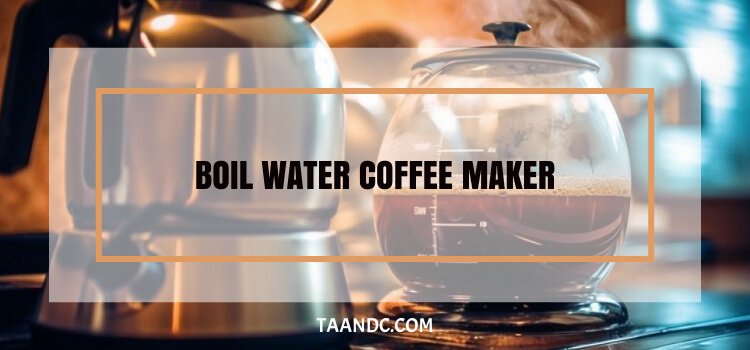The trusty boil water coffee maker has been my morning routine for years. There's something inherently satisfying about the simplicity of this device. With its straightforward functionality, I've consistently enjoyed rich, flavorful coffee without the fuss. From its rapid brewing process to the convenience of having piping hot coffee at my fingertips, this kitchen companion has never failed me. Over time, I've honed my skills in using it, from selecting the finest grounds to maintaining its pristine condition. If you're seeking a reliable brew buddy, look at the dependable boil water coffee maker. Mastering its use can be a source of pride and accomplishment.

Understanding Boil Water Coffee Makers
Definition and Functionality
A boil water coffee maker is a coffee brewing device that operates by heating water to its boiling point and pouring it over coffee grounds to extract flavor. These machines typically consist of a reservoir for water, a heating element, and a filter basket where the coffee grounds are placed. Once the water reaches boiling, it is forced through the grounds, resulting in a brewed coffee beverage. The simplicity of this process makes boiled water coffee makers popular for their ease of use and consistent results.
Types of Boil Water Coffee Makers
The market offers a variety of boiled water coffee makers, each with unique features and functionalities. For instance, a popular choice is the electric drip coffee maker, which automatically heats water to boiling and drips it over the coffee grounds. On the other hand, the stovetop percolator, a classic option, boils water on a stove and cycles it through the coffee grounds multiple times for a stronger brew. Some modern boil water coffee makers even allow for programmable settings, enabling users to tailor their brewing experience to their tastes.
Read More: Breville Bambino Plus Vs Barista Pro: Battle of the Beans
Benefits of Boil Water Coffee Makers
- Convenience: One of the primary benefits of using a boil water coffee maker is its unparalleled convenience. These machines typically have simple operation mechanisms, requiring users only to add water and coffee grounds before starting the brewing process. Additionally, many boiled water coffee makers come with automatic shut-off features, ensuring the coffee is brewed to perfection without constant monitoring. This convenience is a breath of fresh air during busy mornings or when entertaining guests, as it allows users to enjoy freshly brewed coffee with minimal effort, leaving you stress-free and ready to tackle the day.
- Efficiency: Another advantage of boil water coffee makers is their remarkable efficiency in brewing coffee quickly and effectively. By heating water to its boiling point, these machines can extract flavors from coffee grounds rapidly, resulting in a flavorful cup of coffee in a few minutes. This efficiency is a game-changer for those who are short on time but still craving a quality coffee experience. Additionally, some boiled water coffee makers offer programmable settings, allowing users to adjust brewing time and temperature to achieve their desired flavor profile precisely. With a boil water coffee maker, you can start your day feeling time-efficient and productive.
- Flavor Retention: Boil water coffee makers are known for retaining the coffee beans' flavor throughout brewing. By heating water to its boiling point, these machines ensure it is at the ideal temperature for extracting the full range of flavors from the coffee grounds. This results in a rich and aromatic cup of coffee with enhanced flavor characteristics. Additionally, many boiled water coffee makers feature brewing techniques that evenly distribute water over the coffee grounds, further enhancing flavor extraction and ensuring a consistent taste with each brew.
How to Use a Boil Water Coffee Maker
- Preparation Steps: Using a boiled water coffee maker is a straightforward process that begins with proper preparation. Firstly, ensure the coffee maker is clean and free of any debris from previous use. Next, fill the reservoir with fresh, cold water up to the desired level, taking care not to overfill. Then, measure the appropriate coffee grounds according to your preferred strength and flavor. Finally, place the coffee grounds into the filter basket of the coffee maker, ensuring even distribution for optimal brewing results.
- Brewing Process: Once the preparation steps are complete, it's time to start brewing. Turn on the coffee maker and select the desired brewing settings if applicable. The machine will then start to heat the water to its boiling point. As the water heats up, it will gradually pass through the coffee grounds, extracting flavor and aroma. Depending on the type of coffee maker you're using, the brewing process may take a few minutes to complete. Once the brewing cycle is finished, the coffee will be ready to enjoy. Pour it into your favorite mug and savor the delicious, freshly brewed taste.
Maintenance and Cleaning
- Regular Cleaning Procedures: Regular cleaning is essential to maintain the performance and quality of your boil water coffee maker. Start by unplugging the machine and allowing it to cool down completely. Then, disassemble the removable parts, such as the filter basket and carafe, and wash them with warm, soapy water. Use a non-abrasive sponge or brush to remove any coffee residue or buildup. Also, wipe down the exterior of the coffee maker with a damp cloth to remove any spills or stains. Finally, rinse all parts thoroughly with clean water and allow them to air dry before reassembling the coffee maker for future use.
- Descaling Methods: Over time, mineral deposits from water can accumulate inside the internal components of your boil water coffee maker, affecting its performance and the taste of your coffee. Descaling or removing these deposits is crucial to maintaining the efficiency and longevity of your coffee maker. To describe your coffee maker:
- Start by filling the reservoir with equal parts water and white vinegar.
- Run a brewing cycle without coffee grounds, allowing the vinegar solution to circulate through the machine.
- Once the cycle is complete, rinse the reservoir thoroughly with clean water and run another brewing cycle with plain water to remove any leftover vinegar taste.
- Repeat this process as needed, depending on the level of buildup in your coffee maker.
Read More: Bonavita Coffee Maker Stops Brewing Halfway: Update Guide
No Power
When your boil water coffee maker fails to turn on, it can be frustrating, but you can take a few steps to troubleshoot the issue. Start by checking that the coffee maker is properly plugged into a functioning power outlet. If it's plugged in correctly and still doesn't turn on, inspect the power cord for any signs of damage or wear. Additionally, check the circuit breaker or fuse box to ensure no tripped circuits or blown fuses. If the issue persists, it may indicate a problem with the coffee maker's internal wiring or components, and you may need to consult a professional for further assistance.
Leakage
Leakage from a boil water coffee maker can occur for various reasons, but it's essential to address the issue promptly to prevent damage to your machine and surroundings. Begin by checking the carafe and filter basket to ensure they are properly seated and securely in place. If leakage persists, inspect the coffee maker's water reservoir for any cracks or damage that may be causing the leak. Additionally, check the seals and gaskets around the brewing chamber and other components for any signs of wear or deterioration. If you identify any damaged parts, replace them to prevent further leakage.
Brewing Problems
If you're experiencing issues with the brewing process, such as weak or bitter coffee, there are several potential causes to consider. Start by ensuring that you're using the correct coffee-to-water ratio and the appropriate grind size for your preferred brewing method. Additionally, check the filter basket for any clogs or blockages that may impede water flow through the coffee grounds. If the problem persists, it may indicate a malfunction with the coffee maker's heating element or brewing mechanism, which may require professional repair or replacement. Regular cleaning and maintenance can prevent brewing problems and ensure consistent, high-quality coffee with each use.
Safety Precautions
Electrical Safety
When using a boil water coffee maker, it's crucial to prioritize electrical safety to prevent accidents and injuries. Start by ensuring the power cord and plug are in good condition, with no signs of fraying or damage. Avoid using extension cords or power strips, as they can increase the risk of electrical hazards. Always plug the coffee maker into a grounded outlet, and never overload the circuit with other appliances. Keep the coffee maker away from water sources, and never immerse it in water while it's plugged in. Regularly inspect the power cord and electrical components for any signs of wear or malfunction, and discontinue use if you notice any issues.
Burn Prevention
Burns are a common hazard associated with hot appliances like boil water coffee makers, so taking precautions is essential to prevent injuries. Always handle the coffee maker and its components cautiously, especially when hot. Use oven mitts or heat-resistant gloves when handling the carafe, filter basket, or other parts that come into contact with hot water or coffee. Keep the coffee maker out of reach of children and pets to prevent accidental burns. When pouring hot coffee, be mindful of steam and hot surfaces to avoid burns to yourself or others. Finally, allow the coffee maker to cool down completely before cleaning or performing any maintenance tasks to reduce the risk of burns.
Cleaning Safety
Proper cleaning and maintenance are essential for the safe operation of a boil water coffee maker, but it's necessary to follow safety guidelines to avoid accidents. Always unplug the coffee maker and allow it to cool down before cleaning to prevent burns or electrical shocks. Use caution when handling hot water and steam during cleaning to avoid scalding injuries. Follow the manufacturer's instructions for cleaning the coffee maker and its components, using mild detergent and warm water for regular cleaning. Avoid abrasive cleaners or harsh chemicals that may damage the coffee maker's surfaces or internal components. Allow all parts to air dry completely before reassembling the coffee maker for use. Regular cleaning and maintenance will ensure your coffee maker's longevity and help prevent safety hazards associated with buildup or residue.
Comparison with Other Coffee Makers
Drip Coffee Makers
The main difference lies in the brewing process When comparing boil water coffee makers to drip coffee makers. Drip coffee makers typically heat water to a lower temperature than boiling water coffee makers and then drip it over the coffee grounds in a controlled manner. This results in a smoother, milder flavor profile than the robust flavor produced by boiled water coffee makers. Additionally, drip coffee makers are often preferred for their convenience and programmable features, allowing users to set the brewing time and strength according to their preferences.
French Press
Unlike boil water coffee makers, French press coffee makers utilize a manual brewing method that steers coffee grounds in hot water before pressing them through a fine mesh filter. This process allows for greater control over the brewing time and extraction, resulting in a bold and flavorful cup of coffee with a rich, full-bodied taste. French press coffee makers are favored by those who appreciate the ritual of brewing coffee by hand and enjoy this method's intense flavors.
Espresso Machines
While both boil water coffee makers and espresso machines can produce concentrated coffee beverages, they operate using different brewing methods and cater to various preferences. Espresso machines use high pressure to force hot water through finely-ground coffee beans, resulting in a strong, intense espresso shot with a thick crema layer. In contrast, boiled water coffee makers produce a larger volume of coffee with a milder flavor profile, making them suitable for those who prefer a less intense coffee experience. Additionally, espresso machines offer various customization options, allowing users to adjust grind size, water temperature, and pressure to achieve their desired espresso shot.
Environmental Impact
- Energy Consumption: When considering the environmental impact of boil water coffee makers, examining their energy consumption during operation is essential. These coffee makers typically require electricity to heat water to its boiling point, which can contribute to household energy usage. However, technological advancements have led to more energy-efficient models that use less power to achieve the same results. Additionally, users can reduce energy consumption by employing eco-friendly practices, such as using programmable settings to minimize standby power consumption and brewing only the amount of coffee needed to reduce waste.
- Waste Generation: Another aspect of the environmental impact of boil water coffee makers is waste generation, primarily related to disposable components such as paper filters and single-serve coffee pods. While some models offer reusable filters that can help reduce waste, many users still opt for disposable filters for convenience. Additionally, single-serve coffee pods, although convenient, contribute to plastic waste when not properly recycled. To mitigate waste generation, users can choose eco-friendly alternatives such as compostable coffee pods or traditional brewing methods that produce less waste. Additionally, properly disposing of used coffee grounds by composting them can further reduce the environmental impact of coffee consumption.
Read More: Farberware Coffee Maker Not Working: No More Cold Coffee
What is a boil water coffee maker?
A boil water coffee maker is a specialized coffee brewing appliance designed to bring water to a rolling boil precisely when needed for brewing coffee. It ensures that the water is optimal for extracting the full flavor potential from coffee beans.
How does a boil water coffee maker work?
It uses a heating element to rapidly heat the water stored in a reservoir. A thermostat controls the temperature to reach the ideal brewing temperature. Once the water reaches boiling point, it is dispensed evenly over the coffee grounds, initiating the brewing process.
What are the advantages of using a boil water coffee maker?
Boil-water coffee makers offer several benefits, including rapid brewing speed, preservation of coffee bean flavor and aroma, and energy efficiency compared to traditional brewing methods. They also provide precise temperature control for optimal extraction.
How do I clean and maintain a boil water coffee maker?
Regular cleaning is essential to maintain the performance of a boil water coffee maker. Daily wipe-downs, monthly deep cleaning, and periodic descaling with a descaling solution or vinegar are recommended. Following the manufacturer’s instructions for disassembly and cleaning is crucial.
How does boil water brewing compare to other coffee brewing methods?
Boil water brewing has unique advantages, including speed, precision, and energy efficiency. It excels in scenarios where these factors are valued. Comparatively, methods like drip brewing, French press, and espresso have strengths and considerations, making them suitable for different preferences and situations.
Conclusion
The boiled water coffee maker stands out as a versatile and efficient brewing method, offering many advantages for coffee enthusiasts. Its precise temperature control ensures optimal extraction, preserving coffee beans' rich flavors and aromas. Its rapid brewing speed and energy efficiency make it convenient for busy mornings. Understanding the importance of grind size, water temperature, and infusion techniques allows for a customized coffee experience. Moreover, pairing specific coffee beans with precise brewing temperatures opens up flavor possibilities. By maintaining the coffee maker through regular cleaning and descaling, users can prolong its lifespan and ensure consistently delightful cups of coffee. Overall, mastering the art of boiled water brewing empowers individuals to savor coffee at its finest, tailored to their unique taste preferences.


